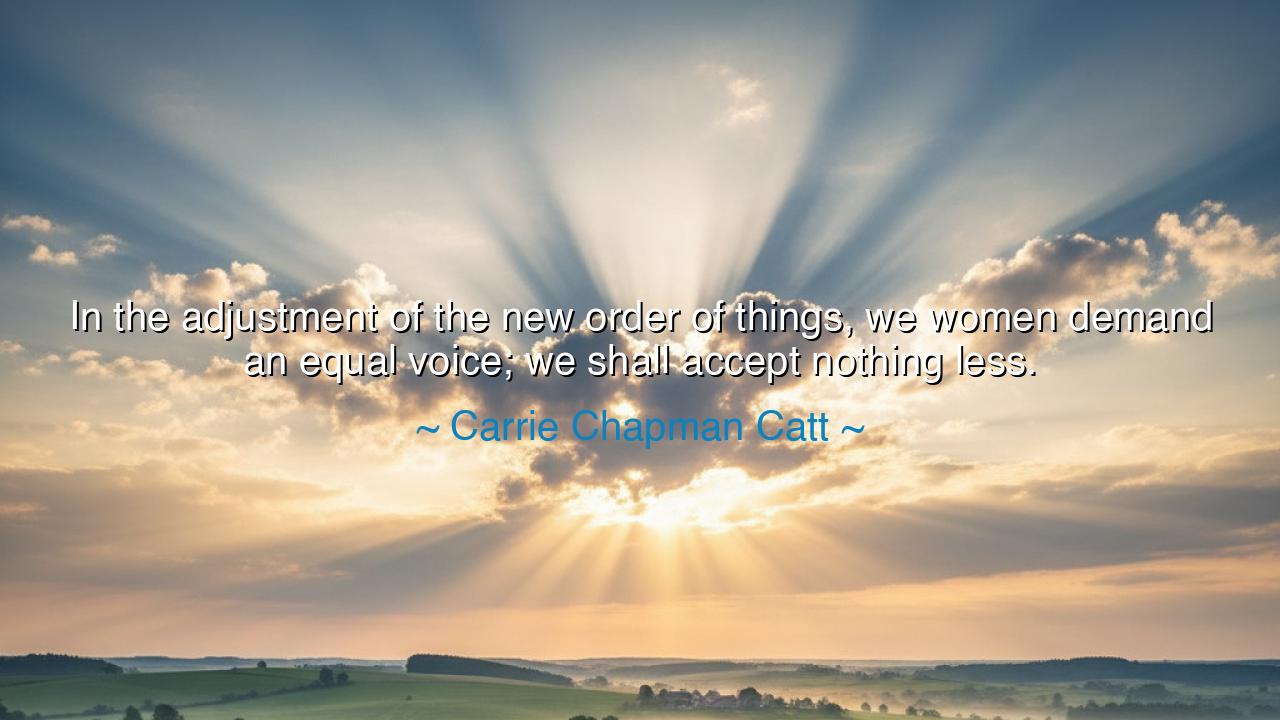
In the adjustment of the new order of things, we women demand an
In the adjustment of the new order of things, we women demand an equal voice; we shall accept nothing less.






The words of Carrie Chapman Catt — “In the adjustment of the new order of things, we women demand an equal voice; we shall accept nothing less.” — thunder with the power of a proclamation, echoing like the cry of a herald at the gates of history. They are not spoken in hesitation or plea, but in command, as one who knows the righteousness of her cause. Catt, a leader of the American suffrage movement, declared with fire that the new order of the twentieth century could not be built upon old chains.
The meaning is fierce and eternal: when societies shift and reshape themselves, justice demands that women be heard. To grant men alone the privilege of shaping law, liberty, and destiny is to build a half-nation, crippled and unjust. Catt’s demand for an equal voice was not a request for favor, but the assertion of an inborn right, denied too long. Her words carry the spirit of defiance, but also of destiny — for she knew the tides of change could not be resisted forever.
History shows the truth of this struggle. Catt, who led the National American Woman Suffrage Association, helped carry the movement to its greatest triumph: the passage of the 19th Amendment in 1920, securing the vote for American women. Generations had marched, written, protested, and endured scorn to arrive at this victory. Some had been jailed, others beaten, but through their suffering the foundation of democracy was made whole. In that moment, the equal voice she demanded was inscribed into law, and the new order began to take shape.
Yet her words remain a warning as well as a celebration. For every age has its new order, its revolutions of thought, industry, and society. In each age, the temptation arises to leave women behind, to silence their voices or diminish their share. Catt’s cry resounds across centuries: we shall accept nothing less — no compromise with half-rights, no patience for partial freedoms.
Let these words be carried to the generations of tomorrow: liberty without equality is a hollow thing, a mask of justice hiding injustice beneath. The equal voice of women is not only their right but the world’s salvation, for without it the new order collapses into the old oppression. Catt’s voice calls like a trumpet: demand, endure, and claim what is yours, until every throne of power and every council of law resounds with the voices of all.






QHNguyen Quang Hai
Carrie Chapman Catt’s words are an important reminder of the relentless push women have had to make in order to be heard. However, in modern times, is there a risk that the demand for equality is sometimes diluted by tokenism or superficial changes? How do we ensure that women are not only given a voice but also genuinely empowered to influence change and decision-making in all areas of society?
LPLyLy Pham
Catt’s call for an equal voice resonates deeply today, especially as we continue to see women fighting for leadership roles and fair representation. What does it mean to have an equal voice in a system that still holds so much power in the hands of a few? How can women not only demand equality but also ensure their voices are amplified and taken seriously in political, economic, and social spheres?
MKMinh Khoi
This quote is a powerful statement of defiance and resolve. I wonder, though, how much has actually changed since Catt’s time. Are women really being heard equally today, or are we still just accepting half-hearted concessions that don’t truly give us a full voice? If women continue to demand equality, what are the challenges they face in a world still dominated by patriarchal systems?
TLTràn Thị Thảo Linh
Carrie Chapman Catt’s quote speaks to the unwavering determination women have in demanding equality. It makes me think about how much progress has been made, but also how far we still have to go. Why is it that women continue to have to fight for equal representation, even in societies that claim to value fairness? What concrete actions are needed to ensure women truly have an equal voice in all matters, particularly politics?